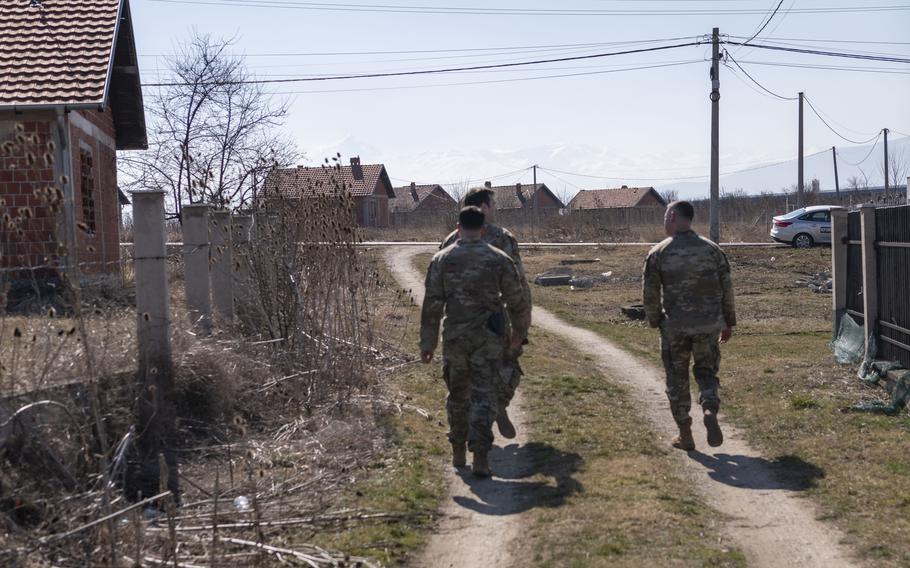
U.S. soldiers conduct a foot patrol in Babush, an ethnic Serbian enclave in Ferizaj, Kosovo, Feb. 22, 2024. A quarter-century after NATO launched a bombing campaign to stop the ethnic cleansing of Albanians in Kosovo, international peacekeeping troops remain on the ground and the security situation remains fragile. (Phillip Walter Wellman/Stars and Stripes)
PRISTINA, Kosovo — This week marks 25 years since NATO launched an air campaign in the Balkans that pushed the Yugoslav army out of Kosovo and prompted the Western alliance to establish a peacekeeping force in the region.
U.S. troops have been on the ground supporting the Kosovo Force, or KFOR, ever since. And while the overall security situation has improved greatly over the years, there are concerns that renewed unrest could make it more dangerous for those deployed here.
Late last month, Texas Army National Guard soldiers handed over leadership of Regional Command East’s headquarters at Camp Bondsteel to the Georgia Army National Guard’s 48th Infantry Brigade Combat Team.
Outgoing commander Col. Ross Walker of the 56th Infantry Brigade Combat Team told Stars and Stripes that the command is “postured to handle anything right now.”
When asked whether he thought Kosovo had become a more dangerous deployment for troops, he said, “the short answer would be no,” adding that most Kosovars, regardless of their ethnicity, respect the peacekeepers’ presence.
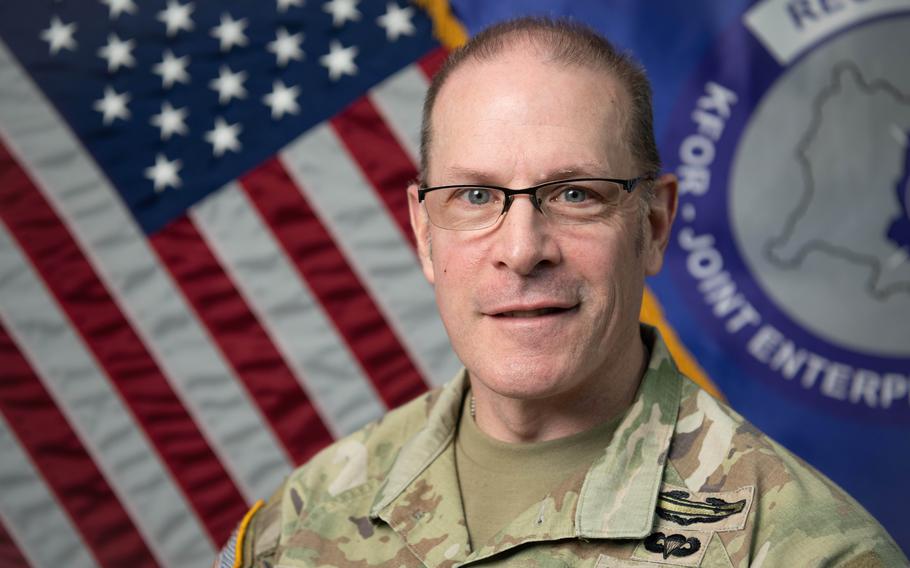
Col. Ross Walker, commander of the Texas Army National Guard’s 56th Infantry Brigade, commanded KFOR’s Regional Command East from June 2023 to February 2024. (Phillip Walter Wellman/Stars and Stripes)
Nevertheless, analysts and others in Kosovo are concerned that ongoing tensions could lead to further clashes and possibly spiral into a larger armed conflict, which peacekeepers could get dragged into.
Kosovo for many Serbians remains a part of their national identity, and a 1389 Serbian victory over the Ottoman Empire in Kosovo is a prominent part of nationalist folklore.
Most ethnic Serbs in Kosovo don’t accept Pristina’s 2008 declaration of independence from Serbia and still see Belgrade as their capital. They’ve been calling for more autonomy.
Last April, they refused to participate in local elections, and ethnic Albanians, who make up more than 90% of Kosovo’s population, won seats in several Serb-majority municipalities.
The results led to protests at government buildings. In May, ethnic Serbs attacked and injured dozens of KFOR soldiers protecting the buildings. No American soldiers were hurt, but three Hungarian troops were shot and one had his leg amputated.
Months later, a shootout in September between dozens of heavily armed Serbian nationalist militants and Kosovo special forces in the northern village of Banjska left an officer and three gunmen dead, in what’s been described as one of the most significant security incidents in the western Balkans in more than a decade.
Kosovo’s interior minister Xhelal Svecla told The Associated Press at the time that a large cache of weapons had been found and that the gunmen had planned to arm hundreds of people, with the intention of seceding.
Svecla accused Serbia of direct involvement, a claim Belgrade denied.
“There is still a lot that’s unclear about what exactly was happening there,” Marko Prelec, a senior analyst at the International Crisis Group, said in a telephone interview. “And it’s still too soon to say that it’s over.”
Prelec believes there will be “a plausible threat” to safety and security in Kosovo for at least another year.
KFOR is the third security responder in Kosovo after the Kosovo Police and the EU Rule of Law mission, respectively.
Kosovars generally respect NATO peacekeepers, as they don’t take a position on Kosovo’s independence, Prelec said, echoing Walker’s assessment.
A handful of countries supporting KFOR, including Greece and Romania, don’t recognize Kosovo’s sovereignty.
While ethnic Serbs may not be pro-NATO, many appear to see the international peacekeepers as filling a trust gap between their communities and Kosovo government forces.
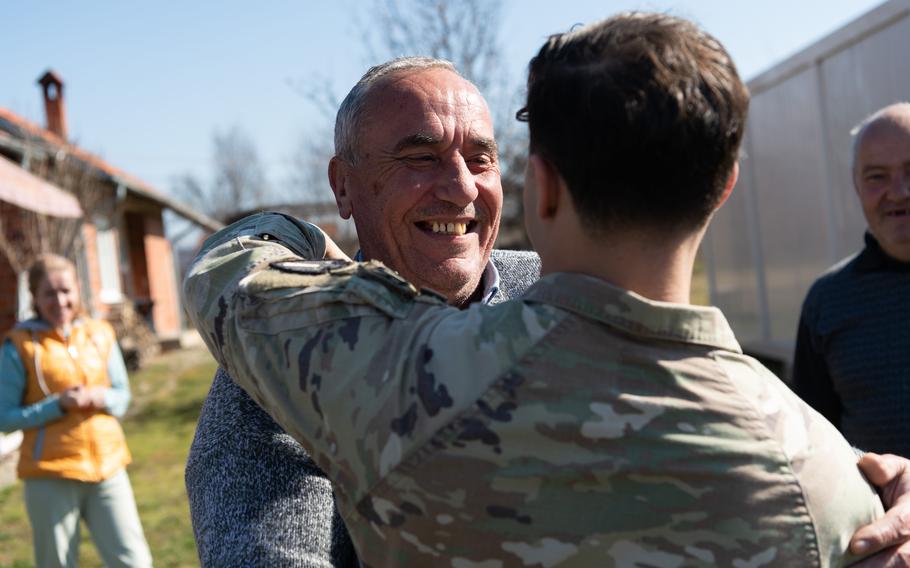
Novica Jovanovic welcomes U.S. soldiers in Babush, an ethnic Serbian enclave in Ferizaj, Kosovo, Feb. 22, 2024. (Phillip Walter Wellman/Stars and Stripes)
On a patrol in late February, U.S. soldiers were warmly welcomed by people in Babush, an ethnic-Serbian enclave in Ferizaj municipality.
The soldiers were part of a liaison monitoring team. They go out, listen to residents’ concerns and try to help find solutions to problems. These problems are often non-political, like figuring out how to fix a building at risk of collapsing.
The monitoring teams complement KFOR squads that are focused on reacting quickly to potential violence.
First Lt. Joseph Mabry, who led the liaison team in Ferizaj, said community engagement can go a long way in maintaining peace.
“The ability for us to support the people here is what builds that sense of community and stability that will build a better future,” Mabry said.
But at the moment, Kosovo’s future looks uncertain.
On Thursday, Prime Minister Albin Kurti posted a video on X, formerly known as Twitter, which he said showed Serbian troops near a Kosovo border area and accused Belgrade of “waiting for the best possible opportunity to invade.”
Serbia’s Defense Ministry rejected the claim as disinformation.
The situation nearly a year after the KFOR troops were injured remains fragile, according to NATO, which says it will keep about 1,000 more peacekeepers in Kosovo indefinitely as a result.
The additional personnel “quadrupled KFOR’s presence in northern Kosovo and tripled the number of patrols,” NATO said in a statement following a Stars and Stripes query.
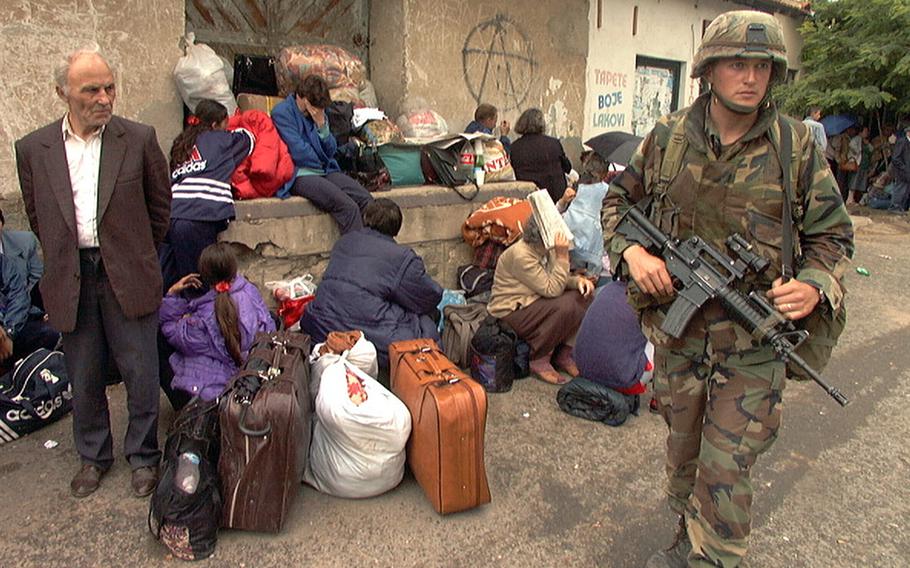
U.S. Army Sgt. Russ Carr walks among a group of Serbians in June 1999, in downtown Ferizaj, Kosovo. The Serbs, fearing retribution from Kosovo Liberation Army soldiers, were waiting for a bus to pick them up and take them away from the town. This week marks 25 years since NATO launched an air campaign that pushed the Yugoslav army out of Kosovo and prompted the Western alliance to establish a peacekeeping force in the region. (Stars and Stripes)
But after a quarter-century, some critics question whether peacekeeping is the most effective use of U.S. troops.
“It’s not a very good use of American taxpayers’ money, or the forces they raise, to have them sitting there doing community tasks,” said Doug Bandow, a senior fellow at the Cato Institute, a libertarian think tank. “We need a military to do military things, not pretend that they are the Peace Corps.”
Today, the number of KFOR troops sits at a little over 4,600, including about 600 Americans.
Bandow believes European allies could cover the relatively modest number of U.S. troops and that now would be an appropriate time for NATO to hand over its longest-standing mission to the European Union.
But Marta Kepe, a senior defense analyst at Rand Corp., says the U.S. military has a strong symbolic value for Kosovo that shouldn’t be overlooked.
Opinion polls show the U.S. is the most trusted international actor in Kosovo, and Americans on the ground, including soldiers, have a unique position of trust, which could be useful as security concerns start to grow again 25 years into the mission.
“We have a high respect for KFOR,” teacher Ismet Balaj said during a visit by soldiers to his school in an ethnic Albanian village in Ferizaj. “Especially for American KFOR.”
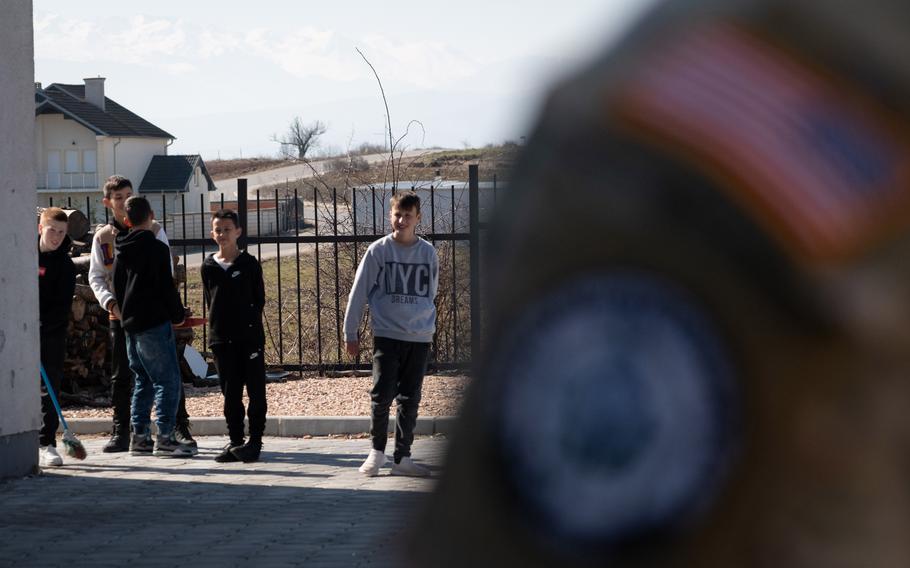
U.S. soldiers visit a school in Ferizaj, Kosovo, on Feb. 22, 2024. A quarter-century after NATO launched a bombing campaign to stop the ethnic cleansing of Albanians in Kosovo, international peacekeeping troops remain on the ground and the security situation remains fragile. (Phillip Walter Wellman/Stars and Stripes)